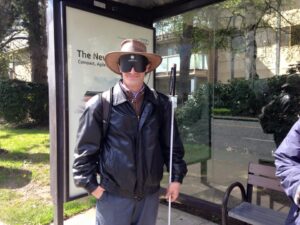
Editor’s Note: Earlier this week we highlighted the story of Kashmere Crystal Bling, her independence journey, and her blinged out cane. As White Cane Week continues in Canada, we decided to feature a second story that prominently features cane travel. Today’s Student Voices article features T.J. Evans, who at the time this panel was presented was a student in the Pacific Training Centre for the Blind’s Blind People in Charge Program. Since then, T.J. has gone on to absolutely master cane travel and now serves as the Pacific Training Centre for the Blind’s primary cane travel instructor. The below was transcribed from the panel discussion titled “The Road Leads Back Home: The pacific Training Centre for the Blind (PTCB)” which was presented by students at the CFB’s 2017 “Vote of Confidence” Convention and moderated by PTCB’s Executive Director, Elizabeth Lalonde.
Hello everybody. My name is Thomas John Evans. Everybody calls me T.J. I’m one of the students from the Pacific Training Centre. I came to them a couple years ago. I was on the transition side – I’ve still got some sight but basically the type of sight I’ve got is not functional. I see a bit of light and it’s also what gets me into trouble because it gives me severe migraines on top of everything. I went from almost not knowing where I was going or what I was going to do. I was trying to give myself my own training because no other place would help me as I had very limited funds and I had even less than I do now.
But PTCB very kindly said, “No, we’re going to help you out.” And they’ve taught me so much and given me a lot of encouragement and direction in things that I did not know – cane travel, for instance. They taught me the techniques and the other skills that go along with cane travel – the auditory, the vibrations, and basically gave me the motivation I needed to do a lot of stuff on my own. They helped me with independence training like life skills, how to develop and rely on my other senses – tactile-wise/what I’m feeling; auditory-wise/what I’m hearing; my sense of direction.
Even though I had a fairly good basis on some of that, they taught me how to refine and focus. They also gave me a proper cane, whereas before I was trying to use a short piece of bamboo. Picture that one. That was quite interesting trying to get myself around with that. They actually gave me a proper cane that was fitted to my height. They taught me the other proper techniques and they gave me a little kick in the butt when I needed it.
One of the first people that helped me with the cane travel was Danielle Frampton (Fernandez) and one of the chief things she taught me was not to be afraid of bumping into things – even when I tried once to lay down in a planter! She told me, “Come on. Get up. Stop resting. Let’s go.” In the way of the encouragement, the way of making you feel that you’re not alone, these people do a great deal and so much more than I can even tell. And they give you such a boost. Even when they’re not teaching you, they’re teaching you something.
In the travel class, which is just one of many blindness skills classes that will be taught at the Bowen Island Centre for the Blind and DeafBlind, students will work with travel instructors, including T.J., to learn the skills they need to travel independently with their white canes. Traveling different environments, from the quiet streets of Snug Cove on Bowen Island to the busy urban core of downtown Vancouver, combined with lessons in long-distance travel skills such as navigating airports, ferries, and busses will set students up to travel successfully, no matter where the journey of life takes them. One of their final assignments before graduation will be to plan a short trip to another city. This will help them put into practice many of the skills they have learned throughout the year.
You too can be a part of making the dream of a Canada where blind and DeafBlind people can live independently with dignity and success a reality by supporting the Bowen Island Centre for the Blind and DeafBlind capital project. Financial support is not the only kind of support a project like this needs. Sharing posts like this one on social media and helping to spread the word about the work we are doing to connect blind and DeafBlind people with the skills they need to be independent is also important.
If you would like to learn more about this project or would like to help in some other way, you are always welcome to reach out and get in touch.
Check out some more of our Student Voices and learn how blindness/DeafBlindness skills training has impacted their lives.